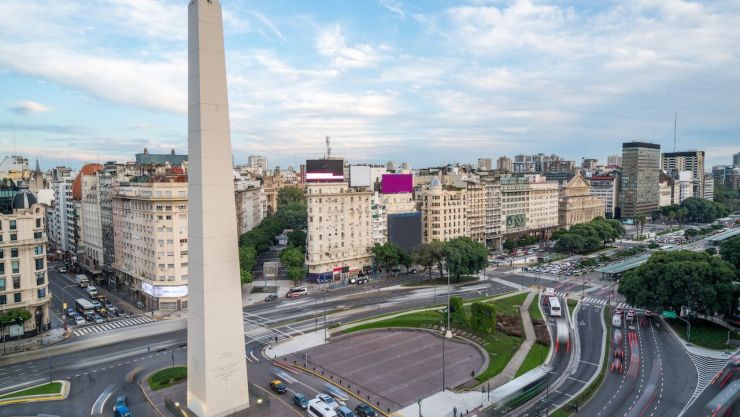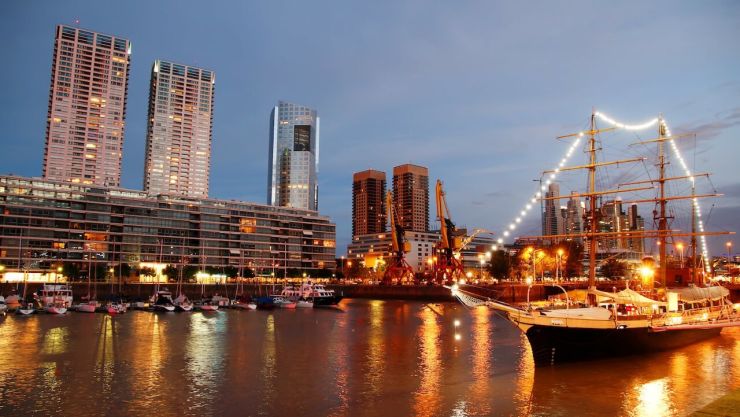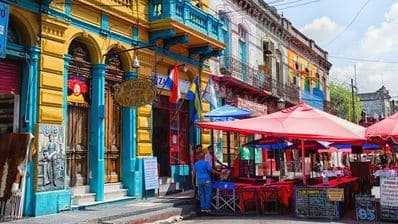With the rising cost of living in many Western countries, retiring to Argentina is growing increasingly popular. Many retirees are able to take advantage of favorable exchange rates and a lower cost of living to enjoy new cultural experiences, access to quality, affordable healthcare and a better climate.
As South America’s second-largest country, Argentina boasts some of the world’s most spectacular scenery, from mountains and lush jungles to massive glaciers, thundering waterfalls, plains and rugged coastlines. Its cities have often been compared to Europe, in terms of their architecture, art, music and literature – but without the high cost of living.
In this guide, we’ll give you all the information you need to retire in Argentina, including the best places to live, the legal documentation you’ll need and how you can start planning your finances for retirement.

The best places to retire in Argentina
Retirement to Argentina offers a little something for everyone. From its relaxing coastal towns to the Andes mountain range and its cosmopolitan cities, there’s an environment to suit anyone here. Argentina’s cities, in particular, can offer an easy lifestyle at a low cost, along with access to a diverse foreign and expat community.
Argentina is a socially liberal country, and has always welcomed immigrants and expats. Especially in larger cities, you’ll find that foreigners and expats can easily fit into a local lifestyle with ease. Most urban areas also offer English-language resources and activities for English-speaking expats.
What are some of the best cities in Argentina?
Buenos Aires, the capital of Argentina, is often referred to as the Paris of the South, and is considered one of the most cosmopolitan cities in the world. While your cost of living will be higher here than in other parts of the country, living in Buenos Aires is well worth it. The city’s art scene, restaurant scene and variety of shops and things to do make it one of the top places to live in Argentina.
While Buenos Aires does have some negatives, from a fairly high petty crime rate to the above-mentioned higher cost of living, most residents love their city and its open, tolerant and welcoming spirit make it extremely popular with foreigners and expats.
Cordoba is Argentina’s second-largest city, and is primarily a college town. Its smaller size means a slower pace of life, a lower cost of living and a lower crime rate than Buenos Aires. It’s a good option for those looking for the conveniences of a city with a small-town feel.
What if I want something more remote?
Argentina is blessed with a naturally beautiful landscape in nearly every direction. If the city is too busy for you, think about Argentina’s wine country, which boasts a year-round pleasant climate, low crime and a relaxed lifestyle, with plenty of activities to keep you busy.
Retirement in Argentina for Americans can mean homesickness for some. The city of Mendoza offers a calmer urban environment in the middle of wine country, with a noticeable American influence and a growing expat community. Or, if mountains are more your style, Bariloche may be a good fit. Although small, the city is nestled in the Andes mountains in the southern end of the country and is a great base for the numerous outdoor activities available.
What are the legal requirements for retiring in Argentina?
There are a number of legal requirements to bear in mind if you wish to retire in Argentina. Most importantly, you’ll need a visa so you can stay in the country long term.
You’ll most likely be interested in the Pensionado temporary visa, which is available to foreign nationals who are over the age of 18 and who receive a pension or retirement income from a foreign government or private pension plan. Upon being granted, this visa will give you temporary residence for a maximum period of one year, renewable for periods of up to three years.
The visa comes with some extra benefits, including the ability to open a bank account, buy property, access healthcare, apply for a driver’s license and register your car in the country. To apply for the Pensionado, you will need to provide proof of your pension or retirement income (which needs to be around 30,000 Argentine pesos per month, as of February 2023), as well as other documents such as a criminal background check and a medical certificate. You may also need to pay a fee and attend an interview at the Argentine consulate in your home country.
What is the healthcare like?
Generally, Argentina’s healthcare system is highly regarded compared to other Latin American countries, with both public and private options available.
However, the standard of care is generally seen as higher in more urban areas. While Buenos Aires will have up-to-date medical equipment and readily available emergency services, the same isn’t guaranteed in the countryside.
You should definitely think about purchasing private health insurance prior to moving to the country, as public hospitals can be overcrowded and may not have specialists required to handle certain ailments.

How much does it cost to live in Argentina?
For those researching retirement in Argentina, one of the most obvious benefits has historically been the cost of living in Argentina. Of course, this can vary depending on where you live and your lifestyle – Buenos Aires, for example, is the most expensive place to live in Argentina.
According to Numbeo, a crowdsourced data platform that tracks the cost of living in cities worldwide, the estimated average monthly cost of living as a single person in Argentina (without rent) is $423.4, while for a single person in the US this figure is $1,032. Both figures should be taken with a pinch of salt as the data is crowdsourced, but they give a sense of how much cheaper it is to live in Argentina than other countries.
Depending on your situation, it might make financial sense to buy instead of rent. Generally in Argentina, there are no restrictions on foreign ownership of property. You’ll pay more for property in a city, though prices are still low compared to most European and American cities. And with a favorable exchange rate, you could save even more. Remember that, if you do choose to buy, it’s best to pay cash to avoid the double-digit mortgage interest rates. With the country’s interest rate at 75% (as of February 2023), be prepared to pay with cash for larger purchases, if you’re able. This can save you money considerably in the long term.
Planning your finances for retirement in Argentina
For one-time, large-sum payments for things like real estate, or for ongoing recurring payments, working with a transfer provider can help you save on both the transfer fees and the rate of exchange.
Historically, the Argentinian peso has been weak against the world’s top currencies, including the US dollar, British pound and the euro. An experienced currency specialist can help you find the most favorable rates to stretch your dollar (or pound, or euro) as far as it can go.
A currency specialist can help in a number of ways, even bringing a wealth of experience with country rules and regulations. Acquiring an Argentina retirement visa may require specific steps to be taken, including financial accountability, and a currency broker can often help with the process. Taxes for international retirees can also be complicated and an international currency specialist may be able to help keep expenses low by managing exposure to currency risk or fluctuating rates.
Lastly, be sure to factor potential healthcare costs into your overall considerations. Argentina does have an excellent national healthcare system that is available to expats, but it’s still a good idea to purchase a private health insurance policy as well.
Part of this guide was written with contributions from ChatGPT. Edits have been made by an in-house editor.








